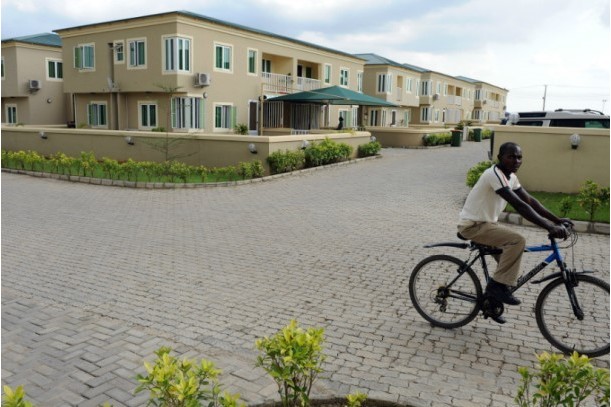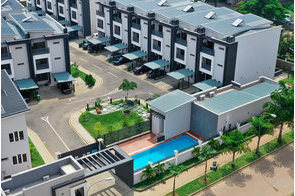Buhari and the housing hope of Nigerians

Summary
Buhari's government should approach housing, not as a brick-and-mortar problem, but as a system.
Nigeria is in a housing crisis. There is a massive shortage of housing. The deficit is estimated to be a whopping 17 million units. Poverty and poor living conditions are very rampant, while decent and good quality housing continues to elude many Nigerians. For too long, housing policies, programmes and deliveries of successive governments in Nigeria have failed to meet the aspirations and expectations of many, especially, low- and middle-income earners. In addition, the affordability problem and slum-housing proliferation continue to constitute major challenges.
In its manifesto for the 2015 general election, the All Progressives Congress stated that in order to meet the housing shortage in the country, the party will “implement a social housing policy of one million low-cost housing units in the first four years, which will create housing and increase skilled and unskilled employment.” While this proposal is commendable, delivering one million housing units in four years (or 250,000 units a year) is an ambitious target for any country, including the developed ones. For instance, the last time the United Kingdom (consisting of four nations of England, Wales, Scotland and Northern Ireland) broke the 250,000 housing barrier was in 1979/80 when over 250,000 housing units were completed. Out of this number, only 107,000 (43%) of the total completions were social houses. In 2013/14, the total number of houses completed by the UK government were around 141,000, with social housing stock representing over 29,000 (21%) of total completions. The APC manifesto to provide one million low-cost housing units in the first four years raises a lot of questions which are better left for another day.
Nevertheless, the APC and Buhari's government can create the environment to facilitate and support the development of good quality and affordable houses for Nigerians. Buhari represents hope to many Nigerians; hope in economic development, security, education; hope in housing and infrastructure development and hope in checkmating the monster of corruption. Should Buhari's government approach housing, not as a brick-and-mortar problem, but as a system, then the housing hopes of many Nigerians will not only be realised, it will also flourish. And good quality housing will be accessible to Nigerians irrespective of their social or economic status. To ensure this, the government will have to put in place a number of initiatives including the ones outlined below.
First, Buhari must avoid taking 'housing short-cuts'. Delivering good quality housing involves rigorous planning and strategic thinking. It involves examining various housing options and working not only with fund managers and financial institutions but also the populace. For instance, it is important to understand that the housing needs of people in Lagos may differ from the housing needs of people in Karu, Abuja or people in Bonny, Rivers State.
The president cannot afford to simply throw money at the housing problem. He would do well to stop the 'Jankara Marketisation' of housing in Nigeria. Developing a fit-for-purpose housing solution does not start with architects or builders or estate managers or contractors. It starts with housing professionals who first and foremost, outline the housing needs and requirements using systems approach and fact-based evidence, supported by planning insights. Buhari would have to establish a Housing Strategy and Policy unit run by competent housing professionals who would set the pace for his housing vision.
Second, and perhaps the most important point, Buhari's would need to review and improve on Nigeria's existing housing finance frameworks. This will ensure the efficient use of resources as well as attract significant investment into the housing sector, especially in the current era of reduced oil revenue. The automatic allocation of grants to states, local governments and developers should be seriously discouraged or stopped. I would recommend that the government should create at least three major funding frameworks for the housing sector. They would include affordable housing fund; market housing fund; and regeneration housing fund.
The market or private sector housing fund would aim at strengthening the capability of the sector to continue to deliver quality housing. (Making the distinction between market and affordable housing is essential for the development of the right housing mix. There is often a misconception of the two terms even among real estate practitioners and public officials.) It is recommended that the market housing programme be managed by the existing private sector structures, and regulated by the government.
The affordable housing fund would be aimed at exclusively developing social housing. Under this plan, state and local governments across Nigeria would have to meet certain criteria prior to accessing this fund. There would also be guidelines for developers who may be willing to access this fund. The regeneration fund would be available to developers and institutions working to redevelop slum housing across Nigeria. While this is a proposal summary, the policy details would have to be developed by the government with the input of stakeholders.
To unlock investment opportunities and to meet the housing needs of people with disabilities, I would recommend – in addition to the above – funding for specialist housing and infrastructure development. The specialist housing fund would make housing accessible and adaptable to people with disabilities such as physical impairments and wheelchair users. The infrastructure development fund would be available to developers, to enable them connect/develop necessary infrastructure for new housing projects.
Third, the Buhari administration cannot overlook climate change. In this regard, its housing agenda must incorporate an environmentally-friendly policy. Measures must be put in place to ensure that all future housing development do not lead to the encroachment on valuable green and open spaces; new developments must include relevant green infrastructure and facilities while also meeting necessary traffic and parking requirements.
Hope is maintaining an optimistic state of mind based on expectation of positive outcomes. But hope can either be dashed or realised. Meeting the housing hopes of Nigerians is a realisable task within favourable fiscal and economic conditions and the right policy mix to attract investment. Buhari's administration would have to tactically unlock the nation's wealth, invest wisely and strengthen existing institutions to ensure deliverable outcomes on invested fund. While the housing policies of past governments have failed to reduce Nigeria's enormous housing deficit, Nigerians are awaiting the delivery of the APC government's 'one million low-cost housing' promise.
Anthony Olowoyeye, a Financial Nigeria guest writer, works with a Local Authority in the United Kingdom within the Housing Strategy and Performance Team. Email: aolowoyeye@yahoo.com.Anthony Olowoyeye
Related
-
Sustainable construction: what, why and how
More sustainable construction is the desire of every stakeholder, from the government to procurement bodies and the ... -
IFC supports green bond to finance green buildings in South Africa
The real estate sector is estimated to generate about 40 percent of the world’s CO2 emissions.
-
At 61, Nigeria should renew commitment to sustainable housing
The cost structure in the Nigerian (urban) real estate market, based on foreign sourcing of housing materials and inputs, ...








